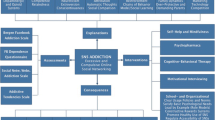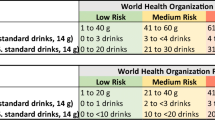Abstract
Purpose
We aimed to quantify associations between drinking and mental well-being, self-esteem and general self-efficacy among New Zealand university students approaching graduation.
Methods
A web-based survey was conducted across all eight New Zealand universities in 2011. Participants were enrolled in their final year of a bachelor degree or a higher qualification and were aged 25 years and under (n = 5082, response level 65 %). Measures included the Alcohol Use Disorders Identification Test-Consumption, Warwick–Edinburgh Mental Well-being Scale, and items from the Rosenberg Self-esteem Scale and General Self-efficacy Scale. Linear regression models were used to estimate associations between the psychological measures and (1) drinking patterns for all participants (abstention/moderate/hazardous); and (2) consumption indicators for non-abstaining participants (frequency/quantity/heavy drinking frequency), adjusting for a range of individual, social and personality characteristics, separately for men and women.
Results
Lower mental well-being was associated with a moderate or hazardous drinking pattern for men, and a hazardous pattern for women, compared to abstaining participants. Higher self-esteem was associated with any level of heavy drinking frequency for men, while the heaviest drinking women had a pattern of lower self-esteem. There was a general pattern of higher general self-efficacy for men and women who drank alcohol.
Conclusions
We observed that higher levels of drinking were associated with small, yet statistically significant, differences in psychological outcomes for men and women. Our findings are of uncertain clinical significance; however, they underscore the importance of investigating a fuller range of social and personality factors that may confound the association of drinking and psychological outcomes.
Similar content being viewed by others
References
Connor JL, Kypri K, Bell ML, Cousins K (2011) Alcohol outlet density, levels of drinking and alcohol-related harm in New Zealand: a national study. J Epidemiol Community Health 65:841–846
Kypri K, Paschall MJ, Langley J, Baxter J, Cashell-Smith M, Bourdeau B (2009) Drinking and alcohol-related harm among New Zealand university students: findings from a national web-based survey. Alcohol Clin Exp Res 33:307–314
Psutka R, Connor J, Cousins K, Kypri K (2012) Sexual health, risks, and experiences of New Zealand university students: findings from a national cross-sectional study. NZ Med J 125:62–73
Kypri K, Langley JD, McGee R, Saunders JB, Williams S (2002) High prevalence, persistent hazardous drinking among New Zealand tertiary students. Alcohol Alcohol 37:457–464
Kypri K, Vater T, Bowe SJ et al (2014) Web-based alcohol screening and brief intervention for university students: a randomized trial. JAMA 311:1218–1224
Connor J, Psutka R, Cousins K, Gray A, Kypri K (2013) Risky drinking, risky sex: a national study of New Zealand university students. Alcohol Clin Exp Res 37:1971–1978
Abayomi O, Onifade PO, Adelufosi AO, Akinhanmi AO (2013) Psychosocial correlates of hazardous alcohol use among undergraduates in southwestern Nigeria. Gen Hosp Psychiatry 35:320–324
Caldwell TM, Rodgers B, Jorm AF, Christensen H, Jacomb PA, Korten AE, Lynskey MT (2002) Patterns of association between alcohol consumption and symptoms of depression and anxiety in young adults. Addiction 97:583–594
Jané-Llopis E, Matytsina I (2006) Mental health and alcohol, drugs and tobacco: a review of the comorbidity between mental disorders and the use of alcohol, tobacco and illicit drugs. Drug Alcohol Rev 25:515–536
Lo CC, Monge AN, Howell RJ, Cheng TC (2013) The role of mental illness in alcohol abuse and prescription drug misuse: gender-specific analysis of college students. J Psychoact Drugs 45:39–47
Said D, Kypri K, Bowman J (2013) Risk factors for mental disorder among university students in Australia: findings from a web-based cross-sectional survey. Soc Psychiatry Psychiatric Epidemiol 48:935–944
Weitzman ER (2004) Poor mental health, depression, and associations with alcohol consumption, harm, and abuse in a national sample of young adults in college. J Nerv Ment Dis 192:269–277
Borsari B, Carey KB (2006) How the quality of peer relationships influences college alcohol use. Drug Alcohol Rev 25:361–370
Molnar DS, Busseri MA, Perrier CPK, Sadava SW (2009) A longitudinal examination of alcohol use and subjective well-being in an undergraduate sample. J Stud Alcohol Drugs 70:704–713
Nezlek JB, Pilkington CJ, Bilbro KG (1994) Moderation in excess: binge drinking and social interaction among college students. J Stud Alcohol 55:342–351
Park CL (2004) Positive and negative consequences of alcohol consumption in college students. Addict Behav 29:311–321
Peele S, Brodsky A (2000) Exploring psychological benefits associated with moderate alcohol use: a necessary corrective to assessments of drinking outcomes? Drug Alcohol Depend 60:221–247
El-Guebaly N (2007) Investigating the association between moderate drinking and mental health. Ann Epidemiol 17:S55–S62
Massin S, Kopp P (2014) Is life satisfaction hump-shaped with alcohol consumption? Evidence from Russian panel data. Addict Behav 39:803–810
Saarni SI, Joutsenniemi K, Koskinen S, Suvisaari J, Pirkola S, Sintonen H, Poikolainen K, Lönnqvist J (2008) Alcohol consumption, abstaining, health utility, and quality of life: a general population survey in Finland. Alcohol Alcohol 43:376–386
Murphy JG, McDevitt-Murphy ME, Barnett NP (2005) Drink and be merry? Gender, life satisfaction, and alcohol consumption among college students. Psychol Addict Behav 19:184–191
Stewart-Brown S, Janmohamed K (2008) Warwick–Edinburgh mental well-being scale (WEMWBS) user guide version 1. University of Warwick, Warwick
Davoren MP, Fitzgerald E, Shiely F, Perry IJ (2013) Positive mental health and well-being among a third level student population. PLoS One 8:e74921
Demakis G, McAdams D (1994) Personality, social support and well-being among first year college students. Coll Stud J 28:235–243
Read JP, O’Connor RM (2006) High- and low-dose expectancies as mediators of personality dimensions and alcohol involvement. J Stud Alcohol 67:204–214
DeNeve KM, Cooper H (1998) The happy personality: a meta-analysis of 137 personality traits and subjective well-being. Psychol Bull 124:197–229
Corbin WR, McNair LD, Carter J (1996) Self-esteem and problem drinking among male and female college students. J Alcohol Drug Educ 42(1):1–14
DeHart T, Tennen H, Armeli S, Todd M, Mohr C (2009) A diary study of implicit self-esteem, interpersonal interactions and alcohol consumption in college students. J Exp Soc Psychol 45:720–730
Glindemann KE, Geller ES, Fortney JN (1999) Self-esteem and alcohol consumption: a study of college drinking behavior in a naturalistic setting. J Alcohol Drug Educ 45:60–71
Roemer A, Walsh Z (2014) Where you live matters: the roles of living arrangement and self-esteem on college students’ hazardous drinking behaviors. Addict Res Theory 22:474–480
Walitzer KS, Sher KJ (1996) A prospective study of self-esteem and alcohol use disorders in early adulthood: evidence for gender differences. Alcohol Clin Exp Res 20:1118–1124
Cooper ML, Frone MR, Russell M, Mudar P (1995) Drinking to regulate positive and negative emotions: a motivational model of alcohol use. J Personal Soc Psychol 69:990–1005
Neighbors C, Larimer ME, Geisner IM, Knee CR (2004) Feeling controlled and drinking motives among college students: contingent self-esteem as a mediator. Self Identity 3:207–224
Pullen LM (1994) The relationships among alcohol abuse in college students and selected psychological/demographic variables. J Alcohol Drug Educ 40:36–50
Pedersen ER, Hsu SH, Neighbors C, Paves AP, Larimer ME (2013) Exploring relationships between facets of self-esteem and drinking behavior among diverse groups of young adults. Addict Behav 38:2581–2585
Luhtanen RK, Crocker J (2005) Alcohol use in college students: effects of level of self-esteem, narcissism, and contingencies of self-worth. Psychol Addict Behav 19:99–103
Ehret PJ, Ghaidarov TM, LaBrie JW (2013) Can you say no? Examining the relationship between drinking refusal self-efficacy and protective behavioral strategy use on alcohol outcomes. Addict Behav 38:1898–1904
Gilles DM, Turk CL, Fresco DM (2006) Social anxiety, alcohol expectancies, and self-efficacy as predictors of heavy drinking in college students. Addict Behav 31:388–398
Kenney SR, Napper LE, Labrie JW (2014) Social anxiety and drinking refusal self-efficacy moderate the relationship between drinking game participation and alcohol-related consequences. Am J Drug Alcohol Ab 40:388–394
Tustin K, Chee K-S, Taylor N, Gollop M, Taumoepeau M, Hunter J, Harold G, Poulton R (2012) Extended baseline report: graduate longitudinal study New Zealand. National Centre for Lifecourse Research, Dunedin
DeMartini KS, Carey KB (2012) Optimizing the use of the AUDIT for alcohol screening in college students. Psychol Assess 24:954–963
Bush K, Kivlahan DR, McDonell MB, Fihn SD, Bradley KA (1998) The AUDIT alcohol consumption questions (AUDIT-C): an effective brief screening test for problem drinking. Arch Intern Med 158:1789–1795
Tennant R, Hiller L, Fishwick R, Platt S, Joseph S, Weich S, Parkinson J, Secker J, Stewart-Brown S (2007) The Warwick–Edinburgh mental well-being scale (WEMWBS): development and UK validation. Health Qual Life Outcomes 5:63
Rosenberg M (1965) Society and the Adolescent Self-image. Princeton University Press, Princeton
Rusticus SA, Hubley AM, Zumbo BD (2004) Cross-national comparability of the Rosenberg Self-Esteem Scale. In: 112th Convention of the American Psychological Association, Honolulu, Hawaii, July 28, August 1, 2004
Schmitt DP, Allik J (2005) Simultaneous administration of the Rosenberg Self-esteem Scale in 53 nations: exploring the universal and culture-specific features of global self-esteem. J Personal Soc Psychol 89:623–642
Schwarzer R, Jerusalem M (1995) Generalized self-efficacy scale. In: Weinman J, Wright S, Johnston M (eds) Measures in health psychology: a user’s portfolio—causal and control beliefs. NFER-NELSON, Windsor, pp 35–37
Luszczynska A, Scholz U, Schwarzer R (2005) The general self-efficacy scale: multicultural validation studies. J Psychol Interdiscip App 139:439–457
Zimet GD, Zimet NW, Farley GK (1988) The multidimensional scale of perceived social support. J Personal Assess 52:30–41
Zimet GD, Powell SS, Farley GK, Werkman S, Berkoff KA (1990) Psychometric characteristics of the multidimensional scale of perceived social support. J Personal Assess 55:610–617
Onyx J, Bullen P (2000) Measuring social capital in five communities. J App Behav Sci 36:23–42
John OP, Donahue EM, Kentle RL (1991) The Big Five Inventory—Versions 4a and 54. University of California, Berkeley, Institute of Personality and Social Research, Berkeley, CA
Kreuter F, Presser S, Tourangeau R (2008) Social desirability bias in CATI, IVR, and web surveys: the effects of mode and question sensitivity. Public Opin Q 72:847–865
Kypri K, Gallagher SJ, Cashell-Smith ML (2004) An internet-based survey method for college student drinking research. Drug Alcohol Depend 76:45–53
van Gelder MMHJ, Bretveld RW, Roeleveld N (2010) Web-based questionnaires: the future in epidemiology? Am J Epidemiol 172:1292–1298
Acknowledgments
The 2011 baseline wave of the Graduate Longitudinal Study New Zealand was funded by the Tertiary Education Commission, the Ministry for Women’s Affairs, and the Ministry of Education. We thank Study director Professor Richie Poulton for helpful comments on an earlier draft of the manuscript, and the participating universities for facilitating the study. All GLSNZ baseline participants are gratefully acknowledged for their important contribution.
Author information
Authors and Affiliations
Corresponding author
Ethics declarations
Ethical standards
The study was approved by the New Zealand Multi-region Ethics Committee (MEC/11/EXP/049). All participants gave informed consent prior to participating in the study.
Conflict of interest
On behalf of all authors, the corresponding author states that there is no conflict of interest.
Electronic supplementary material
Below is the link to the electronic supplementary material.
Rights and permissions
About this article
Cite this article
Blank, ML., Connor, J., Gray, A. et al. Alcohol use, mental well-being, self-esteem and general self-efficacy among final-year university students. Soc Psychiatry Psychiatr Epidemiol 51, 431–441 (2016). https://doi.org/10.1007/s00127-016-1183-x
Received:
Accepted:
Published:
Issue Date:
DOI: https://doi.org/10.1007/s00127-016-1183-x




